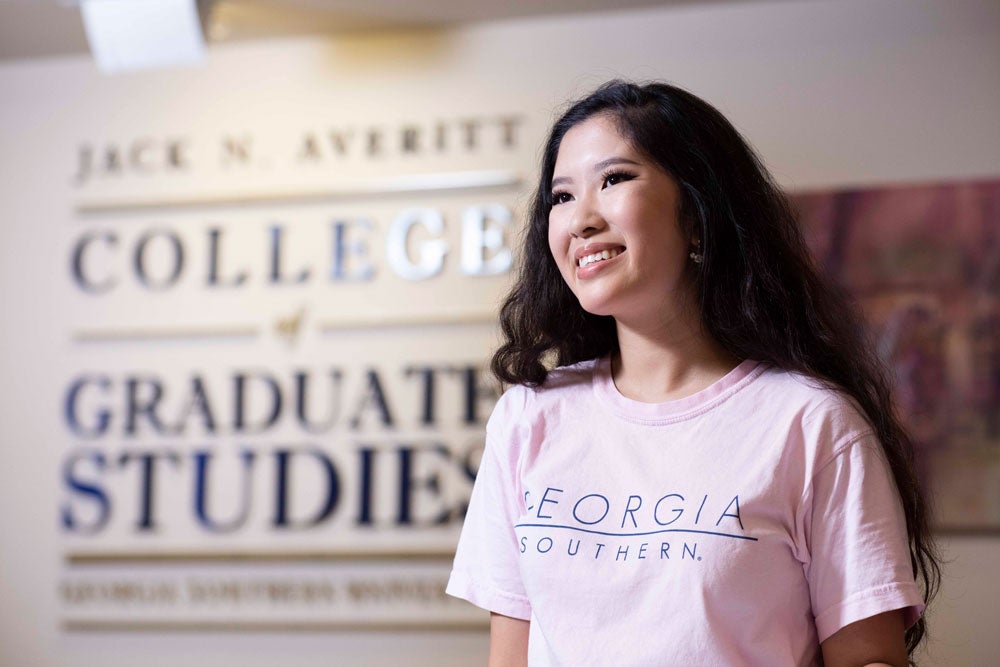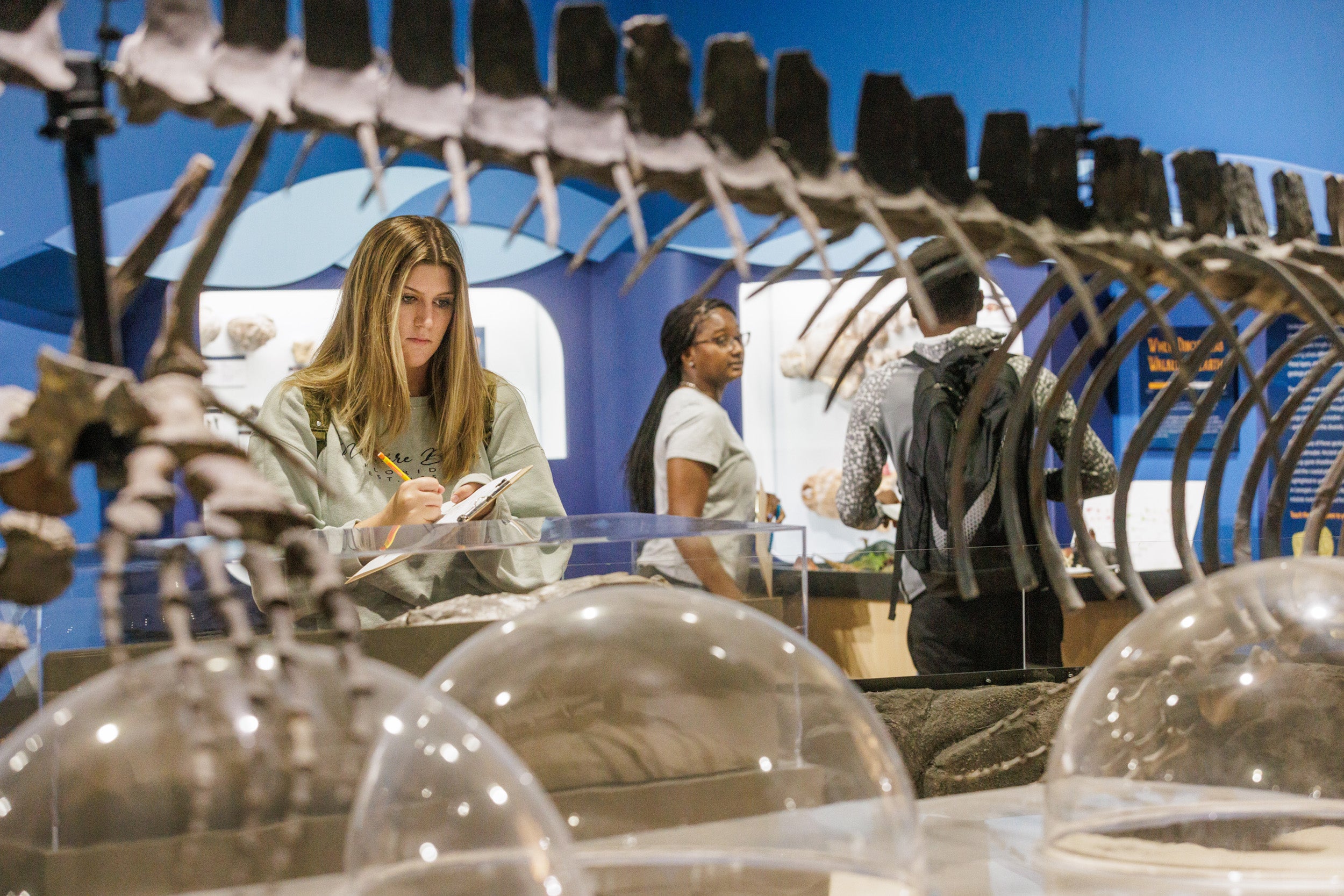Analyze and understand human behavior, choosing from two career-aligned concentrations to connect your passion with in-demand professions or prepare for doctoral study.
Locations
- Statesboro Campus (In Person)
- Armstrong Campus (In Person)
Why Earn a Master’s in Psychology at Georgia Southern?
- Collaborate with experienced faculty in a research-focused program.
- Prepare for certification as a behavior analyst.
- Enter a rapidly growing field with competitive pay.
- High alumni admission rate to doctoral programs.
- 31-36 credit hours to completion.
Acquire a deep grasp of human behavior and hone your analytical skills with a Master of Science (M.S.) in Psychology from Georgia Southern University. Studying alongside expert faculty who are active researchers and experienced practitioners, you’ll broaden your understanding of the profession and acquire the tools needed for success.
You’ll specialize your knowledge by selecting one of two distinct concentrations. In the Behavior Analysis concentration, you’ll learn how to assess people in their environments and craft strategies to help individuals and organizations thrive. Or, study Experimental Psychology to focus on collecting and drawing insights from original data and prepare for further study and careers in academia, clinical psychology, or research.
As you think about your next step forward, you’ll enjoy outstanding instruction and high placement rates across all potential paths.
Ready to Apply?
What Can You Do With a Master’s in Psychology?
With a master’s in psychology, you’ll explore why people react the way they do and how to observe human behavior within wider, more complex contexts. This perspective proves to be an asset in the business world, where you’ll apply your skills in areas like product development, marketing, or analytics. Or, to grow your influence and engage future mental health professionals, you’re positioned to pursue certification and doctoral studies for roles in academia, advanced research, behavioral analysis, or clinical psychology.
Where our graduates work:
- Government agencies
- Hospitals
- Human resources departments
- Marketing departments
- Media organizations
- Mental health centers and clinics
- Product development
- Research
- Schools
- Technology and user experience development
What our graduates do:
- Behavior analyst
- Data analyst
- Human factors engineer
- Medical researcher
- Neuroscience researcher
- Psychologist
What You’ll Learn
Coursework varies based on the concentration selected.
In the Behavior Analysis concentration, you’ll begin with the discipline’s core concepts and principles before exploring research methods, assessment techniques, and strategies to design and implement behavioral interventions. Strongly emphasizing the analysis of original data, the Experimental Psychology concentration focuses on the field’s core areas plus statistics and research design, and you’ll take part in a faculty-mentored project culminating in a written thesis.
See the CurriculumConcentrations
Join your interest in psychology with a curriculum that takes you where you want to go.
Behavior Analysis
Learn to analyze, understand, and formulate strategies to modify behavior on an individual level and within organizations, preparing for certification in this rapidly growing field.
Experimental Psychology
Build your knowledge in the foundational areas of psychology and gain in-depth research experience. An optional teaching emphasis gives you a head start for a career in higher education.
Research
In either concentration, you’ll have the opportunity to collaborate with faculty plus design your own independent research. You’ll build vital skills that set you apart, whether you plan to pursue doctoral studies or embark on an industry role.

Want to Learn More?
Explore essential information about our M.S. in Psychology program, including application details, accreditation status, and licensing disclosures. Gain insight into the program’s credibility and requirements to help you start your journey toward success with the knowledge you need.
The M.S. in Psychology program is open to those with a bachelor’s degree from a regionally accredited institution with a cumulative GPA of at least 3.00 (on a 4.0 scale). You need to have taken Introduction to Psychology, a statistics course, a research methods course, and at least two additional courses in psychology.
We strongly encourage students to obtain research experience as an undergraduate.
To apply, please submit:
- An online application. (There is a $50 non-refundable application fee.)
- A statement of purpose that includes:
- A description of career goals.
- Your reasons for applying for graduate study at Georgia Southern University.
- A list of academic achievements, non-academic achievements, and relevant work experience.
- A self-evaluation of maturity level and character.
- Three letters of recommendation from individuals who can speak of your undergraduate academic performance, potential for graduate study, and maturity level and character. At least one letter must be from a faculty member.
- Transcripts for all prior college- and graduate-level work. Copies can be uploaded with your application; official copies sent directly to the Office of Graduate Admissions will be required for admitted students.
- Official GRE scores. Minimum Graduate Record Exam (GRE) scores are 147 on the Verbal section and 146 on the Quantitative section for applicants who took the exam after July 31, 2011. NOTE: The GRE is OPTIONAL. You may still provide GRE scores, but you are not required to.
Submit your statement of purpose and CV to gradadmissions@georgiasouthern.edu.
International transcripts must be evaluated by a NACES-accredited evaluation service. The evaluation must be course by course and include a GPA.
Application Deadlines
All students admitted to the program begin in the fall semester. The application deadline is February 15.
Your application and all required documents must be received by the deadline.
Provisional Admission
For applicants who meet two out of three of the following criteria for regular admission (GRE-V, GRE-Q, GPA), provisional admission may be granted by the departmental graduate faculty based on their consideration of the materials submitted by the applicant.
Contact Information
Behavior Analysis
Dr. Andrew Bulla
Graduate Program Coordinator
abulla@georgiasouthern.edu
912-344-2803
Experimental Psychology
Dr. Amy Hackney
Graduate Program Coordinator
ahackney@georgiasouthern.edu
912-478-5749
Faculty Feature
Train alongside faculty whose insights propel the field forward. Professor Ty Boyer leads the Cognition, Action, Perception, and Development Laboratory and has published widely in leading psychology journals.
Learn More About Dr. Boyer

Take the Next Step
An exciting and fulfilling career in psychology is waiting. In Georgia Southern’s program, you’ll specialize your perspective to both define your path forward and your impact.
Contact the Department of Psychology:
Statesboro Campus:
Brannen Hall, 1010
P. O. Box 8041
Statesboro, GA 30460-8041
Phone: 912-478-5539
Fax: 912-478-0751
Email: tboyer@georgiasouthern.edu
Armstrong Campus:
Science Center, 201
Savannah, GA 31419
Phone: 912-344-2762
Email: jlwilliams@georgiasouthern.edu




